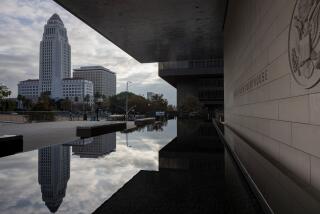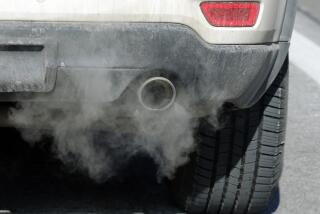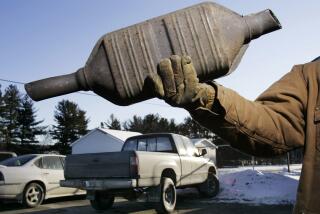2 Plead Guilty to Sales of Fake Jet Parts : Courts: Executives of Fontana firm admit selling substandard engine liners for use in small, private aircraft. The investigation began with a 1992 raid of an Oxnard company.
- Share via
A federal fraud investigation prompted by a 1992 raid of an Oxnard firm led Monday to guilty pleas by two aircraft parts brokers, who admitted selling fake engine parts for small private jets.
The brokers--executives at Ontario Air Parts in Fontana--pleaded guilty to conspiring to defraud the Federal Aviation Administration and private aircraft companies by selling cheap, counterfeit jet engine liners from Taiwan.
James A. Fishback Sr., 60, and Earlene C. Christenson, 45, also acknowledged buying from now-defunct Dixon Aircraft Components of Oxnard worn military engine liners and illegally selling them for use on civilian jets, such as the Lear jet.
In a plea bargain entered in U.S. District Court in Los Angeles, prosecutors said they will recommend sentences of six months in jail and a $250,000 fine for each defendant and a $250,000 fine against the Fontana company, which is owned by Fishback.
Fishback’s attorney, Richard Sherman of Los Angeles, said the company is cooperating with the government investigation.
“There have been some things that have not been handled properly,” Sherman said. But the defendants “are not dangerous or dishonest people.”
The brokers sold to six companies about 60 substandard engine liners for small jets capable of carrying up to 20 passengers, prosecutors said. Nearly all the liners have now been recalled.
“This case is serious because (defendants) circumvented the FAA scheme of regulation, which is designed to ensure that all civilian aircraft parts are up to specifications,” Assistant U.S. Atty. George B. Newhouse said. “There is a huge risk that these parts may fail in flight.”
The lack of federal safety checks was particularly significant in this case because engine liners are so important to a jet’s operation, authorities said. The liners separate the extreme heat of fuel combustion from an engine’s moving parts.
Although no airline crashes have been attributed to counterfeit parts in this country, the use of unapproved parts is seen by experts as a significant problem worldwide.
An aging Norwegian charter plane crashed in 1989 at least partly because of unsanctioned parts, killing 55 people, said Howard Aylesworth of the Aerospace Industries Assn.
In the United States, six small general aviation planes have crashed because of the failure of parts not approved by the FAA, he said.
“All airplanes are manufactured to very, very high tolerances of safety,” Aylesworth said. “But unapproved parts compromise that margin of safety. They create an unknown safety condition.”
FAA spokesman Joe Doubleday, however, said he is not aware of the general aviation crashes cited by Aylesworth. He said counterfeit parts are a concern but have not proved to be an actual safety hazard because so many backups are built into jet aircraft systems.
Investigators have found no crashes or equipment failure linked to parts sold by the Fontana brokers or refurbished by Dixon Aircraft, Newhouse said.
Monday’s convictions bring to 62 the number of fake-aircraft-parts cases successfully prosecuted by federal authorities during the last two years, said Dennis Dutch, a top investigator at the Department of Transportation.
Counterfeit parts were his office’s top priority for the last two fiscal years because of a surge in complaints in 1991, Dutch said. Inquiries have resulted in 92 indictments nationwide. About 150 more cases remain active, he said.
The Fontana case follows by six months a Los Angeles grand jury’s 50-count federal indictment of Rudolf Augustus Dixon for defense fraud. His small Oxnard firm was closed after a raid two years ago by agents from the FBI, Department of Defense and Air Force.
Dixon Aircraft, which repaired worn engines for the U.S. Air Force’s largest cargo plane, the C-5B, was indicted on charges of failing to do required repairs, falsifying maintenance records and overcharging the government.
Dixon, 57, who remains free on bail, was also charged with selling worn-out and obsolete engine parts to commercial airlines. His case is pending.
The Fontana case grew directly from evidence gathered in the 1992 raid. According to federal charges, Fishback telephoned Dixon in 1990 to get him to modify military engine liners used in Air Force F-5 jet fighters so they could be installed in civilian jet engines.
The military and civilian engines are similar because both are manufactured by General Electric Aircraft Engines in Cincinnati.
“Dixon informed Fishback that the modification could not be lawfully performed under FAA regulations,” the charges allege. But Dixon agreed to make the modifications anyway, prosecutors charge.
Meanwhile, in a conspiracy that lasted at least from 1989 through 1992, Fishback’s firm bought numerous military engine liners from Masbe Corp. of Taiwan, removed identifying stickers and sold them for $7,500 as General Electric parts, prosecutors said.
The Fontana firm made about $2,000 extra on each Taiwanese part but perhaps double that on each worn military part altered by Dixon, Newhouse said.
“Drug dealers might look enviously at some of these profits,” he said. Prosecutors listed only two fraud victims in court documents--Jet Sales Leasing Inc. of Columbus, Ohio, and Airwork Corp. of Millville, N.J. But authorities said evidence shows the other companies also received the counterfeit liners.
Other leads from the Dixon search are still being pursued, said Gary Auer, FBI agent-in-charge in Ventura County. The inquiry began in 1991 when a Dixon employee told authorities of widespread cheating at the company.
More to Read
Inside the business of entertainment
The Wide Shot brings you news, analysis and insights on everything from streaming wars to production — and what it all means for the future.
You may occasionally receive promotional content from the Los Angeles Times.










